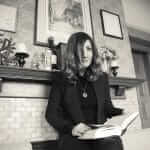Nine Books About Your Life:
July Westhale
Interview by Nicholas Alexander Hayes
In our Nine Books About Your Life series, authors are invited to talk about nine types of books that have had an impact on their lives. Their responses give us a glimpse into their relationships with their books and other people’s books. In this installment, we speak with July Westhale, author of the forthcoming Via Negativa (Kore Press).
First Book – My mom was a reader—she read to me while I was in the womb. And while I think this isn’t an unusual story, it became somewhat poignant for me because she died when I was five, and I moved into a family of non-readers. I write about that here.
Like many kids who were weirdos/had brutal childhoods, books became the portals through which I escaped into lands that made sense: lands of orphans, of anthropomorphism, of a tally-system for good and evil, in which the unseen good deeds of people were rewarded with karmic riches beyond their wildest imagination. I remember saving bugs from roadways for this reason. I remember believing that having a rough childhood meant that I was due some sort of metaphorical pot of gold. All books of a certain time, children’s books or otherwise, reinforce that infrastructural concept.
That said, the first book that had an impact on me was Little Women, Jo March in particular. If there’s any book that reinforces folks making due with the lots they’ve been given—and finding a way to write in the middle of all of it—it’s the tales of resiliency of the March sisters. It doesn’t hurt that the Little Pilgrim’s Progress era of religiosity matched my own Southern Baptist upbringing. And while I left the church as a teenager, liturgical writing was formative and impactful to me; my first introduction to ballad form, to sermon.
Little Women
Louisa May Alcott
Dover Publications
ISBN: 978-0486828060
Most Cherished Book – I had a teacher, Mr. Mac, who was my hero. He was my high school English teacher, my Academic Decathalon coach (yep, I was that kind of nerd), and the first person to introduce poetry to me in a meaningful way, which is to say, to illustrate that poetry has much to give to young people, particularly those who find themselves searching for a kind of form that enacts the varied experiences of ennui (forgive me, I was fourteen when I discovered poetry).
Mr. Mac died five years after I graduated high school, from melanoma, and it was his death that moved me to apply for an MFA in Poetry. About six months after he died, I took a good friend to my hometown to show her where I came from, and we spent hours walking through my high school wending our way to Mr. Mac’s old classroom. When we got there, I found an Oxford dictionary in rough shape outside his door, being used as a doorstop. Across the binding of it, written in sharpie, was MAC. It’d been his.
That dictionary, though I never use it, is not ever terribly far from where I write and read.
Most Perplexing Book – I’ve tried a number of times to read Infinite Jest, because I’d had similar difficulties reading Joyce’s Ulysses while studying Comparative Literature as an undergraduate. I’d hoped to find similar, illuminating moments (Joyce’s connection to Virginia Woolf didn’t hurt him in my esteem, either), but it’s been ten years since I first picked up Foster Wallace’s book, and I confess—I still find it unreadable. Perhaps I have less tolerance for the masculinity of perceived genius than I used to, or perhaps I don’t find the narratives of super wealthy folks terribly interesting, but likely it’s a lack of ability to sew together the fragmentation that plagues me. I’m sure it’s a user error.
Life-changing Book – This is a terrible question only in that there are too many books to name—and perhaps says something about my flightiness of character, if I’ve truly had that many transformations in my lifetime. However, there are definitely some starring leads—
Dorothy Allison’s book Bastard Out of Carolina taught me, at sixteen, how vital and important it was to have narratives of poverty and dysfunction. It inspired me to write my first collection of poetry, Trailer Trash. Robin Coste Lewis’ Voyage of the Sable Venus showed me (and continues to show me) what poetry can do not only formally, in terms of art and craft—but also civically, for a people. Lucia Berlin’s Manual For Cleaning Women taught me, like Allison’s book, about class-based power of observation, and how astounding trauma-informed witness to the world can be, when partnered with cunning and wit, especially.
Bastard Out of Carolina
Dorothy Allison
Plume
ISBN: 978-0452287051
Voyage of the Sable Venus: and Other Poems
Robin Coste Lewis
Knopf
ISBN: 978-1101911204
Manual For Cleaning Women: Selected Stories
Lucia Berlin
Picador
ISBN: 978-1250094735
Most Underrated Book –Most people greatly admire—and justifiably so—Donna Tartt’s The Gold Finch, which is a rather remarkable book. However, I find that her novel Secret History, which follows a group of Classics scholars/friends down a path of tragedy and murder akin to the Greek myths they’re so well-versed in to be a complete masterpiece of both artfulness and intrigue. Meaning, it has the chops of masterful writing, but is also an extremely juicy read.
Secret History
Donna Tartt
Knopf
ISBN: 978-1400031702
A Surprising Book – As mentioned previously, I was a Comparative Literature scholar at one point in my life, focusing on North and South American literature. As such, I have a truly embarrassing love of William Faulkner—like, ride or die, The Sound and the Fury is my favorite novel of all time, despite Faulkner’s obviously terrible way of rendering women, and the ways in which the politics of his novels are very, very far from my own. When I was enmeshed in the whitewashed world of academia, loving Faulkner as a young person was a sort of point of pride, but now I’m careful about who I disclose that information to—and, surely, that love has not gone unexamined in my older and wiser years.
While politically questionable, my love of Faulkner isn’t particularly trashy, so I’ll also add that before Gossip Girl became the teen soap opera that launched Blake Lively into the cycle of playing the same kind of woman forever, I will say that I read all of the books.
The Sound and the Fury
William Faulkner
Norton
ISBN: 978-0393912692
Your Most Recent Book – My second collection of poetry, Via Negativa, just came out with Kore Press in the middle of June. “Via negativa” means the process of describing something by describing what it is not, and applies, broadly, to divinity (or the idea of “god”), but in this collection I ponder how it might also apply to the writing of poetry (ars poetica), and also desire.
It was a somewhat fraught experience, writing this collection, in part because my first collection was about my childhood, and had a very specific and clear political agenda (discussion of class and rural poverty, particularly in a rich state like California). “Via Negativa” is more cerebral, with a smorgasboard of different kinds of forms, and more use of space on the page.
I confess I felt nervous about reception of this collection—that it would be seen as esoteric, not of the people. And as a person with a politic of ‘poetry for the people’, that made me very nervous. However, I’ve found that this collection has allowed for a discussion of the ecstatic and poetry’s place in a world of intentional joy and desire and artfulness to be.. particularly timely.
Via Negativa
July Westhale
Kore Press
ISBN: 978-1-888553925
Your Next Book – Amazingly, I’ve been working on a novel for the last two years. While I always imagined I’d write a novel at some point, I actually stumbled into this trajectory; while taking a screenwriting class two summer ago, I’d been approached by an agent who had read a nonfiction piece I’d published in McSweeney’s. I was encouraged to start working on a novel.
This story is a speculative fiction narrative about a town near my hometown that was razed during the midcentury in order to become a popular boating lake. It imagines how this idea would fare if it happened now (or, really, 2024), with Big Water as a key player, and is told from four different POVs: two teenage girls (who are best friends/in love), a crooked cop, and a female preacher who believes the impending flood is a sign of divine providence.
Side note: while researching this project, I found that the original town (which the story is based on) was photo-documented by none other than Dorothea Lange!
Plug a Book – My pal Joey Gould wrote a real stunner of a book that came out last year through Lily Poetry Press—it’s called The Acute Avian Heart and has the kind of sharp wit and real prowess with language that you kinda always want collections of poetry to have. I can’t recommend it enough.
The Acute Avian Heart
Joey Gould
Lily Poetry Review
ISBN: 978-1733768344
About July Westhale
 July Westhale is a writer, translator, digital publisher, and monomanic human living in Oakland, California. She is the author of “Trailer Trash”, which won the 2016 Kore Press Book Award, and Via Negativa, which Publishers Weekly gave a starred review and wrote: “With subtlety and skill, Westhale reminds the reader that sensory experience is irrevocably changed once it is relayed in language.” She also has a salty collection of chapbooks with very inventive names. Booklist once wrote: “Westhale’s poetry seems accompanied with a tuning fork’s pitch, a heightened, pressing, weaponized immediacy. Whatever she faced to earn that ability would have killed a lesser mortal, we can be sure.” www.julywesthale.com
July Westhale is a writer, translator, digital publisher, and monomanic human living in Oakland, California. She is the author of “Trailer Trash”, which won the 2016 Kore Press Book Award, and Via Negativa, which Publishers Weekly gave a starred review and wrote: “With subtlety and skill, Westhale reminds the reader that sensory experience is irrevocably changed once it is relayed in language.” She also has a salty collection of chapbooks with very inventive names. Booklist once wrote: “Westhale’s poetry seems accompanied with a tuning fork’s pitch, a heightened, pressing, weaponized immediacy. Whatever she faced to earn that ability would have killed a lesser mortal, we can be sure.” www.julywesthale.com
About the Interviewer
 Nicholas Alexander Hayes (Review Editor) lives in Chicago, IL. He is the author of NIV: 39 & 27 and Between. He has an MFA in creative writing from the School of the Art Institute of Chicago, and he is currently completing an MA in Sociology at DePaul University. He writes about a wide range of topics including ’60s gay pulp fiction, the Miss Rheingold beauty competition, depictions of masculinity on Tumblr, and whatever piece of pop cultural detritus catches his eye at the moment.
Nicholas Alexander Hayes (Review Editor) lives in Chicago, IL. He is the author of NIV: 39 & 27 and Between. He has an MFA in creative writing from the School of the Art Institute of Chicago, and he is currently completing an MA in Sociology at DePaul University. He writes about a wide range of topics including ’60s gay pulp fiction, the Miss Rheingold beauty competition, depictions of masculinity on Tumblr, and whatever piece of pop cultural detritus catches his eye at the moment.
